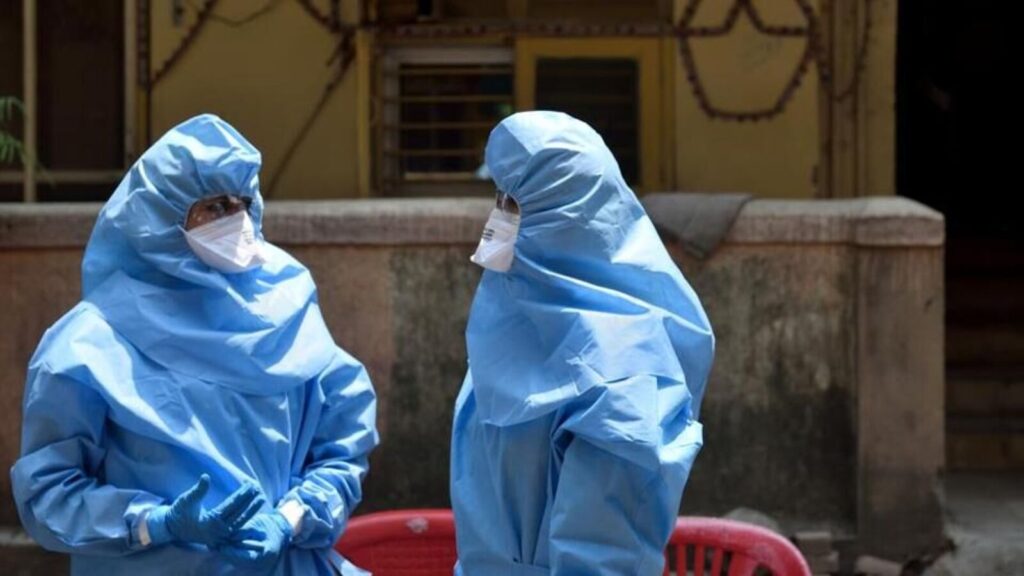The health departments of Singapore and Hong Kong had last week notified about an increase in COVID-19 infections, which is caused by SARS-CoV-2 virus.
In the wake of reports about the surge in coronavirus cases, India had convened a review meeting on Monday. Should we be concerned about this current “wave” of COVID-19? What is causing the latest surge in cases? Here’s all you need to know:
Singapore’s Ministry of Health said in a press release on May 13 that the estimated number of COVID-19 cases in the week of April 27 to 3 May 2025 rose to 14,200 cases, compared to 11,100 cases in the previous week.
“Over the same period, the average daily COVID-19 hospitalisations rose from 102 to 133…The hospitals are currently able to manage the increase in cases,” the Singapore government said.
It noted that the average daily Intensive Care Unit (ICU) cases decreased from three to two cases.
COVID-19 cases in Hong Kong
Similarly, in Hong Kong, the percentage of respiratory samples testing positive for the SARS-CoV-2 virus gradually increased to 13.66 percent from 6.21 percent four weeks ago (the week of April 6 to 12) — which is a record high in the past year.
The authorities said COVID-19 became more active in mid-April of this year. “Based on previous statistics, we expect the activity level of COVID-19 to remain at a higher level for at least the next few weeks,” the Controller of the Centre for Health Protection (CHP), Dr Edwin Tsui, said.
COVID-19 cases in India
Following recent media reports of a surge in COVID-19 cases in Singapore and Hong Kong, the Ministry of Health and Family Welfare (MoHFW) in India convened a review meeting on Monday.
The meeting included experts from the National Centre for Disease Control (NCDC), Emergency Medical Relief (EMR) division, Disaster Management Cell, Indian Council of Medical Research (ICMR) and central government hospitals, sources told news agency ANI.
As of May 19, 2025, the number of active COVID-19 cases in India stands at 257 — a very low figure considering the country’s large population. Almost all of these cases are mild, with no hospitalisation required.
The Union Health Ministry remains vigilant and proactive in monitoring the situation closely, ensuring that appropriate measures are in place to safeguard public health.
What is causing rise in COVID-19 cases?
Singapore’s health ministry said the increase in cases could be due to several factors, including waning population immunity.
Meanwhile, an analysis by Hong Kong’s CHP revealed that the “active periods” are associated with the changes in the predominant circulating strains and declining herd immunity in Hong Kong.
How common are ‘active periods’ of COVID-19?
Hong Kong’s health department believes that COVID-19 has evolved into an “endemic disease with a periodic pattern.”
It noted, “After the resumption of normalcy, Hong Kong experienced cycles of active periods of COVID-19 in every six to nine months.”
Singapore’s health ministry also noted that periodic COVID-19 waves are expected throughout the year.
Which COVID-19 strain is causing current rise in cases?
The Hong Kong authorities said in a statement on May 15 that the XDV strain of the COVID-19 virus has been circulating locally since late March this year.
“In early 2024, the predominant strains circulated locally changed from XBB to JN.1; while in the third quarter of 2024, they changed from JN.1 to KP.2 and KP.3; and they have further changed to XDV since late March this year,” stated a press release by the Government of the Hong Kong Special Administrative Region on May 15.
Meanwhile, Singapore’s health ministry highlighted that at present, LF.7 and NB.1.8 (both descendants of the JN.1 variant) are the main COVID-19 variants circulating in Singapore.
They together account for more than two-thirds of locally sequenced cases. JN.1 is also the variant used in the formulation of the current COVID-19 vaccine.
Should you be worried about this COVID-19 wave?
The answer is: No.
According to the information, cases in Singapore and Hong Kong are mostly mild and not associated with unusual severity or mortality.
Hong Kong’s CHP said there is no evidence suggesting that XDV will cause more severe disease.
Singapore’s health ministry also explained that there is no indication that the variants circulating locally “are more transmissible or cause more severe disease compared to previously circulating variants.”
Meanwhile, India’s top epidemiologist Dr Raman Gangakhedkar told News 18 there is no need to panic unless there is evidence of an increase in hospitalisations or deaths.
“…as of now, there is nothing new or alarming,” Dr Raman Gangakhedkar said, adding, “We must accept that COVID-19 has become endemic.”
“The only caution for the elderly and immunocompromised individuals is to follow COVID-appropriate behaviour like maintaining hand hygiene, wearing masks, and avoiding crowded places,” Dr Gangakhedkar said.

